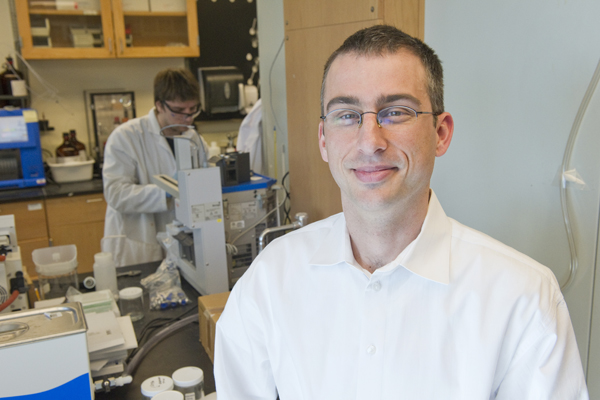Calling attention to neglected diseases

Chemistry professor Michael Pollastri and his team of 12 post-doctoral, graduate and undergraduate students are combining their science skills and idealism to bring attention — and solutions — to diseases neglected by Big Pharma research.
Neglected tropical diseases, such as sleeping sickness and Chagas disease, affect the poorest parts of the world, where unsafe water, poor sanitation and limited access to basic health care are common. The diseases are typically transmitted by insects, and can result in debilitation or death.
Pollastri says these diseases are neglected by the pharmaceutical industry because they would not be able to recoup or profit from the billions of dollars spent on drug research and development.
“It is not necessarily that the problems of creating a drug for these neglected diseases are intrinsically more difficult, it’s that there hasn’t been a concerted effort from industry to do so,” said Pollastri, who specializes in medicinal chemistry and chemical technology.
Since receiving funding from the National Institutes of Health in the spring of 2009, Pollastri has focused on research that will expedite the drug-discovery process for neglected diseases. The effort supports Northeastern’s commitment to use-inspired research, with a focus on global challenges in health, security and sustainability.
“There are very few people working in this area, and I felt we could make a big impact,” he said.
Pollastri and his research team collaborate with leading experts from across the globe, including England, Spain, Switzerland and the United States, whose focus is on African trypanosomiasis, or sleeping sickness, and other neglected diseases.
In his lab at Northeastern, he and his team repurpose existing small molecular compounds being used by big companies and modify them to try to inhibit the parasites associated with the diseases. They then ship them all over the world to be tested by their research collaborators.
After testing the molecules, the experts upload the data to a shared database, which provides Pollastri and his team with the information necessary for the next phase of development.
“This is how a drug company works. Except normally, chemists and biologists are in adjacent labs and ours are all over the world,” Pollastri said.
They quickly found that one compound, which is used by a leading pharmaceutical company for cancer treatment, was incredibly potent at killing parasites related to sleeping sickness in culture tests and in animals.
“This is not the norm,” Pollastri explained. “Drug discovery normally takes a very long time.”
Pollastri left a leading pharmaceutical company to pursue this research. He was attracted to Northeastern because he was impressed with the undergraduate students who complete co-ops in the industry. “When they come back to the lab, they know the language of industrial drug discovery, they know how to run experiments,” he said.
Said Murray Gibson, dean of the College of Science: “Thanks to innovative approaches to repurposing drug development, Mike hopes to leverage the massive economic engine that has led to blockbuster drugs and combat neglected diseases.”
Pollastri’s research was conducted through the Center for Drug Discovery at Northeastern, which is committed to finding novel medications and developing new approaches and technologies aimed at improving the discovery of new therapeutic drugs.





